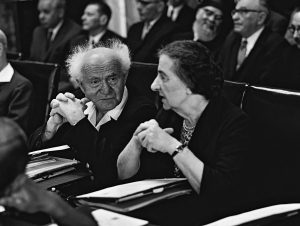
The Golda Meir Institute for Political and Social studies
We are living through one of the defining moments in modern history which has a huge number of conflicting versions of the future. Many socio-political processes depend on global trends and actions of key actors.
The Golda Meir Institute has a goal to form a research agenda in Israel by bringing together leading experts in various fields of political science, philosophy, sociology.
The Golda Meir Institute focuses on:
- Encouraging decision-makers, regardless of their affiliation with governments or political parties, to think long-term to avoid the risk of an unfavorable future and to increase chances of positive development;
- Stimulating strategic thinking by identifying important trends and potential threats;
- Researching the implications of political and social analytical developments that will help meet current global challenges and take advantage of changing political and economic architecture;
- Playing a trendsetting role in the national research field and forming a hub for think tanks in the USA, Europe, and Israel;
- Promoting Golda Meir’s concepts of nation and state building.

The institute is named after Golda Meir, who served Israel in a multitude of official capacities including Ambassador to Moscow, Foreign Minister, and Prime Minister during the difficult period of the Yom Kippur War.
She was a very modest person, totally devoted to the cause of Zionism. She could always see right to the heart of a situation or topic.
David Ben-Gurion called her “the best man in the government“. Among the 37 signers of Israel’s Declaration of Independence were only two women, one of whom was Golda Meir.
Being one of the key figures in creating the State of Israel, Golda Meyer laid down basic principles of the foreign and domestic policy of the Jewish State, which are still relevant today.
Main research topics in 2024
- Knesset elections under new conditions
Next Knesset elections will take place against the backdrop of public demand for renegotiating the Social Contract with the State. For the first time in many years, elections will be held without the participation of Benjamin Netanyahu, who, apparently, will leave the political Olympus. Presidential race in the United States and its results will also have a certain impact on the parliamentary elections in Israel.
- Contemporary Russian Politics
In the period from 2024 to 2030, Russian political system will go through a complex transformation. New system that will take place as a result of the transfer of power, is being formed today. Not only will the governance model change, so will the Russian society, its values and political consciousness. The main objective of the research program is to understand all aspects of the Russian state administration system (version 2030). Independent analysis of political, economic and social processes will allow to determine and predict directions for the development of modern Russia.
- Red lines for Israel.
Balance of security, freedom and independent state policy is an important aspect of public life in Israel. What are the red lines crossing of which may prompt Israel to reconsider its policy? Questions for study – Cohabitation with Arabic population along the borders Vs Fight against terrorism Vs Global image of Israel as democratic State.
- Political, economic, and ideological aspects of European anti-Semitism
Research intends to prove that anti-Semitism emerges and exists as an artificial phenomenon, rather than as a consequence of natural reasons. It will describe modern mechanisms of conducting anti-Semite campaigns in order to predict and prevent them.
- Post-Traumatic Stress Disorder (PTSD) – challenge for the next decade
Identification and relief of PTSD in the military and among civilians is a global trend of the 21st century due to the huge number of local conflicts and natural phenomenas such as floods and earthquakes. It requires unique approaches that correspond to modern realities, specifics and socio-psychological characteristics of the population.
- Socio-psychological characteristics and needs of repatriates
Increase in the number of repatriates from post-soviet countries, Europe and the US; changes in their qualitative characteristics set the task for the State of Israel to revise the approach to absorption and adaptation of repatriates. Its’ effect on social and political life in Israel.
Contact us: golda@goldameir.co.il
The Golda Meir Institute for Political and Social studies © 2023 – 2024. All Rights Reserved.

